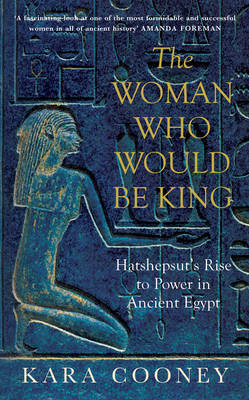Reviewed by gmcgregor on
Quick, name me an Egyptian queen. I'm guessing that for most of you, Cleopatra crossed your mind. Maybe some of you went for Nefertiti. But while Cleopatra is remembered for her dramatic life and death and Nefertiti is remembered for her beauty, the queen that had probably the most successful reign as the ruler of Egypt has been largely forgotten: Hatshepsut. Like most Egyptian queens, she was initially married to her brother, Thutmose II. But he was sickly, and when he died when she was only about 16, she successfully finagled a role as regent for her toddler stepson/nephew, Thutmose III, and from there, had herself crowned king in her own right alongside him. In The Woman Who Would Be King, author Kara Cooney walks us through how Hatshepsut pulled off this highly unusual feat by using the authority and power she'd acquired through her religious role, surrounding herself with the right advisors, and emphasizing her own royal lineage. During her reign, she embarked on an ambitious temple building program throughout her country and maintained her country's security while continuing to subjugate its vassal states. Her gender was, of course, the elephant in the room, and Cooney describes how Hatshepsut's depiction of her own gender in statuary shifted over time, from frank acknowledgement of her femininity near the beginning (when she served as regent) to an entirely masculine presentation as her co-ruler grew up and became a man himself. She goes on to detail what became of Hatshepsut's legacy after she passed and how Thutmose III initially embraced but ultimately rejected reminders of her rule, having artistic depictions of her altered or destroyed to erase to her from the record as much as possible.
Cooney is an actual Egyptologist, and it shows: she presents tons of information about ancient Egyptian social, religious, and royal life in the context of spinning Hatshepsut's story. She must be a good teacher in her day job as a college professor...the information she gives us is detailed but not dull; it doesn't feel like reading a reference text. For as much as we do know details about ancient Egyptian society, it's amazing to me how much we don't know at the same time...Cooney's writing, as well-researched as it is, is peppered with "probably" and "might have", because there is just no way to know for sure. I'll admit I found this same quality irritating in Stacy Schiff's Cleopatra: A Life, but maybe that's just because I'm relatively accustomed to reading about Cleopatra in the context of historical fiction. I've never read about Hatshepsut before, so I don't have the same kind of expectations about being told a fleshed-out story. Also, Cooney makes it very clear, repeatedly, that the kind of records that would lead to a better story simply don't exist, because the Egyptians at that time kept written records only of the official version of events, with any sort of juicy personal interest tidbits left off entirely.
Cooney's writing is lively and interesting, and I think she does a good job of presenting the information in a way that makes you care about it...she doesn't just dump it out there without context, it's always clear that the things she's telling you about are necessary for an understanding of what happened. That being said, unless you're inclined to enjoy reading a factually-dense non-fiction book, you might find your attention wavering during some of the longer passages about religion or royal administration.
Reading updates
- Started reading
- 19 January, 2016: Finished reading
- 19 January, 2016: Reviewed
